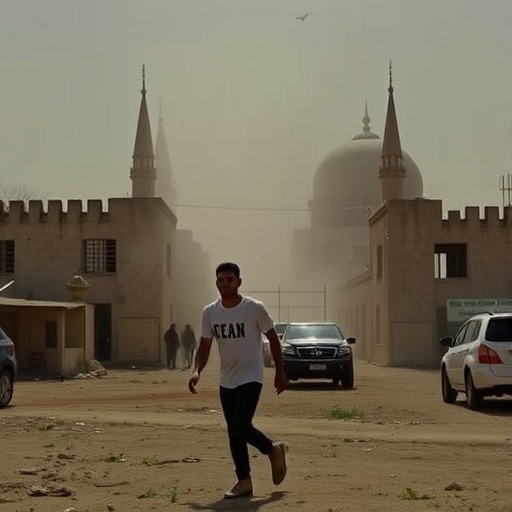White House Issues Stark Warning to Israel as UN Flags Imminent Famine in Gaza
In a dramatic escalation of diplomatic pressure, the White House has delivered a pointed warning to Israel over its military operations in Gaza, coinciding with a dire United Nations report that reveals no food aid has entered the besieged territory since early October, thrusting over 2.2 million Palestinians into the shadow of famine.
- White House’s Unprecedented Rebuke Signals Shift in U.S. Policy
- UN’s Dire Famine Projections Expose Gaza’s Humanitarian Abyss
- Israel’s Military Strategy Under Fire Amid Aid Restrictions
- Global Outcry Builds as Allies Urge Ceasefire and Aid Surge
- Pathways to Relief: Ceasefire Talks and Long-Term Solutions on Horizon
This unprecedented blockade, amid ongoing conflict, has ignited global outrage and raised fears of a humanitarian catastrophe. U.S. officials, traditionally staunch allies of Israel, expressed deep concern that the restrictions could exacerbate the already dire situation, potentially leading to widespread starvation and disease. The UN’s assessment paints a grim picture: acute malnutrition rates are soaring, with children and the elderly bearing the brunt of the crisis.
The White House statement, issued late Wednesday, underscores a growing rift in U.S.-Israel relations, as President Biden’s administration balances support for Israel’s security with mounting calls to avert a famine in Gaza. “We urge Israel to take immediate steps to allow humanitarian aid to flow freely,” a senior White House official stated, emphasizing that failure to do so could have “devastating consequences” for civilians.
White House’s Unprecedented Rebuke Signals Shift in U.S. Policy
The White House’s warning marks a rare public admonition from Washington toward its closest Middle East ally. Historically, U.S. support for Israel has been unwavering, with billions in annual military aid and vetoes at the UN Security Council shielding Jerusalem from international criticism. However, the intensifying crisis in Gaza—triggered by Hamas’s October 7 attack that killed over 1,200 Israelis and led to Israel’s retaliatory campaign—has tested these bonds.
Speaking anonymously to reporters, a White House spokesperson revealed that internal deliberations have grown heated. “The images coming out of Gaza are heartbreaking,” the official said. “We cannot stand by while famine looms. Israel must prioritize civilian protection under international law.” This rhetoric echoes recent statements from Secretary of State Antony Blinken, who during a Middle East tour last month called for “unimpeded access” to aid corridors.
Behind the scenes, diplomatic cables and intelligence briefings have reportedly painted a stark picture. U.S. assessments indicate that Israeli forces have inadvertently—or in some cases, deliberately—restricted access to key border crossings like Rafah and Kerem Shalom. Since early October, not a single truckload of food has crossed into Gaza, according to UN logs. This has left stockpiles depleted, with bakeries shuttered and markets barren.
Experts point to this as a pivotal moment. “The White House is walking a tightrope,” said Aaron David Miller, a senior fellow at the Carnegie Endowment for International Peace. “Pushing too hard risks alienating Israel, but ignoring the famine risk could damage U.S. credibility in the Arab world.” Miller’s analysis highlights how domestic U.S. politics, including pressure from progressive Democrats and Jewish advocacy groups, are influencing the administration’s stance.
Furthermore, the warning includes subtle threats of leverage. While no aid cuts have been announced, congressional hearings are underway to scrutinize U.S. arms transfers to Israel. Lawmakers like Senator Bernie Sanders have introduced bills to condition aid on humanitarian compliance, amplifying the White House’s message.
UN’s Dire Famine Projections Expose Gaza’s Humanitarian Abyss
The United Nations’ latest report, released Tuesday by the World Food Programme (WFP) and the Food and Agriculture Organization (FAO), delivers a chilling verdict: Gaza teeters on the brink of famine, with 96% of its population facing acute food insecurity. “This is not a prediction; it’s an unfolding reality,” UN Secretary-General António Guterres declared in a video address. “No food entering Gaza since early October means hundreds of thousands—perhaps millions—are at risk of starvation.”
Statistics underscore the severity. Prior to the blockade, Gaza imported 500 truckloads of food daily to sustain its 2.2 million residents. Now, zero. The UN estimates that malnutrition cases have surged by 300% in the past month alone, with over 15,000 children under five showing signs of acute wasting. Hospitals in Gaza City and Khan Younis report overcrowding, with pediatric wards overwhelmed by dehydration and stunted growth cases.
Personal stories amplify the data’s horror. In a refugee camp near Jabalia, 35-year-old mother Aisha Al-Masri shared her desperation with UN observers: “My children haven’t eaten properly in weeks. We boil weeds from the rubble for soup. If this continues, we’ll all perish.” Such testimonials, gathered by UNICEF teams navigating perilous conditions, highlight the famine’s human toll.
The UN attributes the crisis directly to the aid blockade, compounded by infrastructure destruction. Israeli airstrikes have leveled over 60% of Gaza’s agricultural land, per satellite imagery analyzed by the UN. Water purification plants, vital for preventing cholera outbreaks amid famine, lie in ruins. “Famine isn’t just hunger; it’s a cascade of death from disease and despair,” warned WFP Executive Director Cindy McCain in a Geneva briefing.
Globally, the report has spurred action. The UN General Assembly is convening an emergency session, while humanitarian NGOs like Doctors Without Borders report a 500% increase in aid appeals. Yet, logistical hurdles persist: Israeli security checks, often delaying or denying convoys, have become a flashpoint.
Israel’s Military Strategy Under Fire Amid Aid Restrictions
Israel defends its actions as necessary to dismantle Hamas infrastructure embedded in civilian areas, but critics argue the aid blockade amounts to collective punishment. Prime Minister Benjamin Netanyahu’s office issued a terse response to the White House warning: “Israel remains committed to minimizing civilian harm while targeting terrorists. Humanitarian aid will resume once security is assured.”
Yet, evidence suggests otherwise. Human Rights Watch documented instances where Israeli forces fired on aid trucks approaching crossings, citing “security threats.” In one incident last week, a convoy bound for northern Gaza was turned back after a two-hour wait, its perishable goods spoiling under the sun.
Military analysts note that Israel’s ground offensive, now in its third month, has displaced 1.9 million Gazans—85% of the population—into shrinking safe zones. These areas, lacking markets or farms, rely entirely on external aid. “The famine risk is a direct byproduct of the siege tactics,” said military expert Sarah Leah Whitson of Democracy for the Arab World Now. “Israel’s strategy prioritizes military gains over lives.”
Internally, Israel faces divisions. Defense Minister Yoav Gallant, who infamously called Gaza a “human animal zone,” has softened his tone amid international pressure, promising to “facilitate aid flows.” But far-right coalition partners resist, viewing concessions as weakness against Hamas.
Broader context reveals patterns. Gaza’s blockade, imposed since 2007, has long stunted its economy, with unemployment at 45% pre-war. The current famine threat exacerbates a 16-year saga of restrictions, drawing parallels to historical sieges that led to mass suffering.
Global Outcry Builds as Allies Urge Ceasefire and Aid Surge
The White House’s intervention has galvanized international response. In Europe, the European Union foreign ministers convened virtually, issuing a joint statement condemning the “unacceptable” aid halt and calling for UN-monitored corridors. France and Germany pledged €100 million in emergency funds, though delivery remains uncertain.
Arab nations, led by Egypt and Jordan, have ramped up border pressures. Egypt, controlling the Rafah crossing, reported clashes with Israeli forces attempting to enforce closures. “This famine is man-made and must end,” Egyptian President Abdel Fattah el-Sisi stated during a Cairo summit attended by Palestinian Authority leaders.
At the UN, a coalition of 50 countries is pushing a resolution demanding immediate aid access, though U.S. support remains lukewarm to avoid vetoing Israel. Amnesty International’s latest report accuses both sides of war crimes, but focuses on Israel’s role in engineering the famine through “deliberate deprivation.”
Civil society mobilizes too. Protests in Washington, D.C., and Tel Aviv draw thousands, chanting against the blockade. Celebrities like actor Mark Ruffalo and musician Coldplay’s Chris Martin have amplified UN calls via social media, boosting awareness and donations.
Economically, the crisis ripples outward. Global food prices, already inflated by the Ukraine war, face new strains as Gaza’s plight diverts aid from other hotspots like Yemen and Sudan.
Pathways to Relief: Ceasefire Talks and Long-Term Solutions on Horizon
As the famine specter looms, mediators eye breakthroughs. Qatar and Egypt, longstanding brokers, report progress in indirect talks between Israel and Hamas. A proposed 48-hour humanitarian pause could allow 200 trucks daily into Gaza, per UN estimates—enough to stave off immediate famine for 500,000 people.
The White House is actively involved, with special envoy Brett McGurk shuttling between Jerusalem and Doha. “A ceasefire is the only sustainable path,” President Biden affirmed in a recent interview, hinting at incentives like normalized ties with Saudi Arabia for Israel.
Long-term, experts advocate rebuilding Gaza’s infrastructure. The UN’s $1.2 billion flash appeal seeks funds for desalination plants, greenhouses, and schools. International donors, including the U.S., have committed $500 million, but sustained peace is prerequisite.
Yet challenges persist. Hamas’s refusal to release hostages without guarantees, coupled with Israel’s demand for demilitarization, stalls progress. Famine projections warn that without action in the next two weeks, irreversible damage—stunted generations and societal collapse—could ensue.
Looking ahead, the crisis tests global norms. Will the White House’s warning catalyze change, or deepen divides? As UN agencies brace for the worst, the world watches Gaza, where survival hangs by a thread amid whispers of hope for relief.








